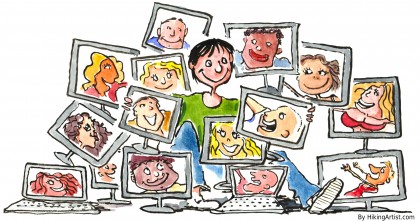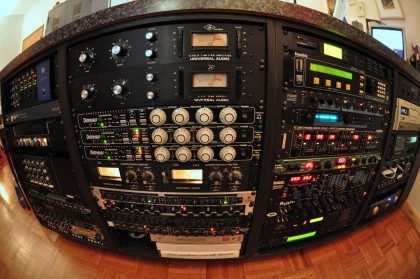How I Spent My Autumn Vacation
Devra Torres | Oct 2, 2014 | 1 cmt
At considerable inconvenience and expense to many generous people, I just spent a week flying to and riding around New England to see nearly every single member of my very extensive extended family. I flew down to Baltimore (because that’s where Southwest likes to take everybody, regardless of their chosen destination) and then up to New Hampshire. I stayed with my parents and then with my sister’s family, which includes not only nine children and one on the way but also Boomer, a dog who’s bigger than most of them.

My father, sister, nephew, and brother-in-law took it in shifts to drive me to a certain strategically located McDonalds which lies halfway between my New Hampshire hometown and my other sister’s teeming dwelling in Rhode Island. One brother rode there on his motorcycle to see us all; another stopped by despite an impending midnight shift at work. Yesterday I flew back to Michigan, meaning to hit the ground running, only to be blindsided by a broken refrigerator and computer and a lost cat.

The question is, in the age of Skype, Facebook Messenger, and unlimited talk and text, why would anyone bother to do that, and be glad (as I am) that she did?
The answer is not easy to put your finger on. What do you gain, exactly, by being in someone’s physical presence? Or in a certain location? Anything you can’t get through the wonders of technology?

We’ve come up with so many instruments to extend the powers of the senses.With microscopes and telescopes, and even glasses, we can experience sense impressions that could never happen without them. With recording devices, we pick up data from the past, and if we slow it down we can come into contact with realities we would have been oblivious to, like the harmonies of these crickets. And, as my teenagers tell me, we can even use something called auto-tune to make celebrity “recording artists” out of people who can’t sing, digitally correcting and “improving” their voices until they hardly sound human at all.

Then there are telephones, email, and chat. Now we can instantly communicate with someone who's physically absent. With Skype—if you have a good connection and high-resolution image--you might as well be with someone “in person.” Right? Or if not, why not?

There are some obvious differences, of course. You can’t taste or touch or smell things over the internet (probably just as well). So Skype can't duplicate the elusive combination of fresh coffee, burnt toast, and old New England basement that says home to me. Besides, some people (is it just me?) dislike the experience of Skyping: it feels awkward and artificial. Also, you can’t know for sure whether your Skype-mate is looking at you or something else on his screen.
But aside from such minor--and possibly surmountable--technical and psychological limitations, what’s the difference?

David Hume believed human beings are nothing but “bundles of perceptions”: mere focal points of sense experiences. I'm pretty sure that's an incoherent idea, but if it were true, being with someone would simply be a matter of reproducing the sense impressions associated with their presence. We can’t fully do that now, but the virtual reality people are working on it.
Aldus Huxley imagined it almost a century ago when he invented the idea of going to the “feelies” instead of the movies. A harrowing sci-fi story called “Spectator Sport” by John D.MacDonald goes further. MacDonald imagines a world in which everyone's highest aspiration is to spend the rest of his days in an underground cubicle (in a disused subway tunnel) surgically attached to a machine that provides you with the sense perceptions of the protagonist of various movies. The working class gets to experience this intermittently; the priveleged few become "perms," and don't ever have to stop.

Technology that makes instant audiovisual contact possible is a wonderful thing, if used well. It's not intrinsically good or evil; it doesn't lead inevitably to more superficial or artificial relationships. It can do just the opposite. As with many such novelties, the problem lies not so much in what they do as what they displace.
But even if I can't say exactly why, I wouldn't trade this last week of face-to-face contact with my inimitable relatives for the most cutting-edge of virtual-contact techniques.


Comments (1)
Katie van Schaijik
Oct 5, 2014 1:37pm
In the last week or two, Jules and I have gone to two outstanding drama productions: King Lear (in Philadelphia) and Fences (at the People's Light and Theatre, where our daughter Rose sometimes works.) I can't remember the last time I saw a professional play, but I know it's been many years.
At both, I was practically bowled over by the impact of the physical presence of the actors. I hadn't realized how unaccustomed to that I'd become, and what a difference it makes. I also never felt before what a total bodily commitment and vulnerability is involved in stage acting. They have to give themselves and expose themselves to each other and an audience in a way that screen actors don't.
It's a much realer and more intimate experience than watching a movie.
And whereas before I thought that the sophistication and omnipresence of technology would mean that live acting is becoming obsolete, I now think that it's so superior a human experience that it may well make a come back in the culture.
We need as many antidotes to alienation as we can get.